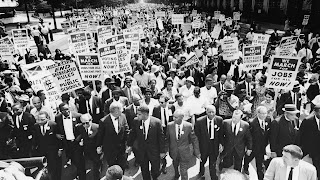 |
| The Fourteenth Amendment (1868) granted African Americans citizenship |
The United States Civil War, which raged from 1861 to 1865, marked a pivotal moment in American history, resulting in the abolition of slavery and the preservation of the Union. However, the war's end did not immediately grant black people full rights as American citizens. If, hypothetically, black people had gained full rights immediately after the Civil War, the trajectory of American history would have been profoundly altered. This scenario would have had significant implications for social, economic, and political developments in the United States.
Social Implications
Immediate Equality and Integration: Granting full rights to black people right after the Civil War would have meant the immediate end of racial segregation and discrimination in public spaces, education, and employment. African Americans would have had access to the same opportunities and resources as white Americans, leading to a more integrated and inclusive society. This early integration could have fostered greater understanding and cooperation between races, reducing racial tensions and conflicts that persisted throughout American history.
Cultural Renaissance: With full rights, African Americans would have had more freedom and resources to express and preserve their culture, contributing significantly to American arts, music, literature, and intellectual life. The cultural renaissance experienced during the Harlem Renaissance in the 1920s could have occurred much earlier, enriching American culture and promoting greater appreciation of African American contributions.
Economic Implications
Economic Empowerment: Full rights would have allowed black people to own property, start businesses, and access quality education and employment opportunities. This economic empowerment would have led to the creation of a robust black middle class much earlier. The economic contributions of African Americans would have significantly boosted the national economy and reduced the economic disparities that have long plagued the country.
Wealth Accumulation: Early access to property ownership and business opportunities would have enabled African Americans to accumulate wealth and pass it down through generations. This intergenerational wealth transfer would have played a crucial role in reducing the wealth gap between black and white Americans, promoting economic stability and prosperity for African American communities.
Political Implications
Political Representation: Full rights would have included the right to vote and run for public office. African Americans would have participated in the political process from the outset, leading to more diverse and representative government bodies. Early political representation would have ensured that the interests and concerns of African American communities were addressed in policymaking, leading to more equitable and inclusive laws and policies.
Civil Rights Movement: With full rights granted immediately after the Civil War, the need for the Civil Rights Movement of the 1950s and 1960s might have been diminished or taken a different form. The struggle for equality and justice would have been fought in political arenas rather than through social movements, potentially avoiding some of the violence and resistance that characterized the Civil Rights era.
Educational Implications
Access to Quality Education: African Americans would have had equal access to quality education, leading to higher literacy rates and better educational outcomes. This access would have opened doors to higher education and professional careers, fostering a generation of African American leaders, scholars, and professionals who could contribute to the nation's development.
Desegregation of Schools: The immediate desegregation of schools would have promoted diversity and inclusion in educational institutions, providing all children with the opportunity to learn and grow together. This early exposure to diverse perspectives and cultures would have contributed to a more tolerant and cohesive society.
Conclusion
The immediate granting of full rights to black people after the Civil War would have transformed the United States into a more inclusive, equitable, and prosperous nation. By addressing racial inequalities from the outset, America could have avoided much of the racial strife and economic disparity that have marked its history. This hypothetical scenario highlights the profound impact that early and comprehensive civil rights reforms could have had on the nation's development and underscores the importance of continuing efforts to achieve true equality and justice for all.
Black Codes
What happened to slaves after they were freed
What happened to slaves after the Civil War
What did Martin Luther King, Jr, do
Examples of Black Codes
What did the Black Codes do
Who wrote the Black Codes
Confederate general during the Civil War







0 Comments